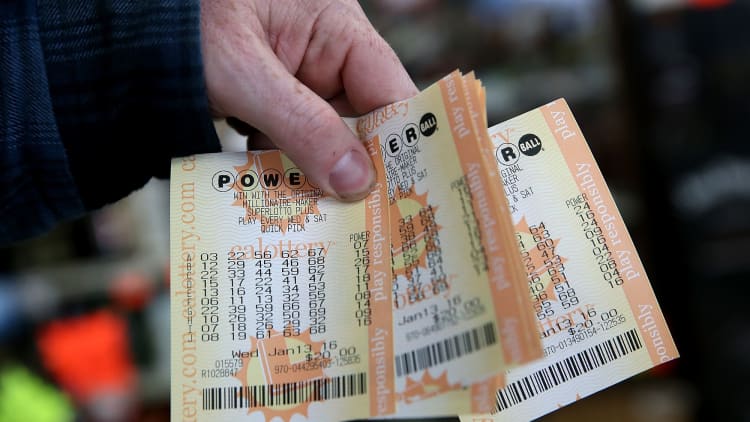
There were not winning tickets for the latest drawing in two major U.S. lotteries, sending the jackpots ballooning for early 2018.
The Powerball jackpot is now $440 million, and the Mega Millions stands at $343 million. Both games had their most recent jackpot wins in late October.
Because no winning tickets were sold for 2017, the next jackpots will be subject to the new tax rules. The next Powerball drawing is slated for Wednesday at 10:59 p.m. ET, and the next Mega Millions drawing is at 11 p.m. ET on Tuesday.
It's only the second time U.S. lottery players have had two opportunities to try for jackpots exceeding $300 million.
(Although large, neither is a record-setting amount: For either to land in the top 10 of U.S. jackpots, they would have to surpass the $448.4 million Powerball shared by two winners in August 2013.)
The rule of thumb is that you walk away with about a third of [the jackpot].Susan BradleySudden Money Institute
The first time both games simultaneously had jackpots topping $300 million was in early August. The Mega Millions was the first to pay out, with Patricia Busking of Illinois taking home $393 million in mid-August.

The Powerball climbed to $758.7 million before Mavis Wanczyk of Massachusetts won in late August. That jackpot was the second largest in the game's history and the second largest in U.S. lottery history. It was also the largest prize ever awarded to a single ticket.
How investors would handle a multi-million-dollar lottery win
| Take the lump sum | 74.8% | Take the annuity | 25.2% |
| Claim the ticket immediately | 43.4% | Wait to come forward | 56.6% |
| Consult a lawyer/accountant/financial advisor before claiming | 80.1% | Claim the ticket with no outside help | 19.9% |
| Remain anonymous | 90.7% | Step into the spotlight | 9.3% |
| Quit my job immediately | 48.1% | Keep working | 51.9% |
| Hire a financial advisor | 63.6% | Manage it myself | 36.2% |
Source: SOURCE: TD Ameritrade
Even if you win, you won't walk away with the full amount. Lottery site USAMega.com estimates the federal tax withholding on the $215 million Mega Millions lump sum would be $53.75 million, and state taxes could knock out up to another nearly $19 million (with New York the worst offender). For the Powerball, those tax tallies for the $278.3 million cash prize would be roughly $69.6 million and up to $24.5 million, respectively.
Under the new tax legislation's brackets, a winner with that kind of nine-figure income in 2018 would still end up in the top bracket, but with a slightly lower rate of 37 percent.
The kicker: State and local income taxes paid would be capped at $10,000 as an itemized deduction. The loss of that deduction whittles a few million more off your take-home. (The luckiest winners will still be in those states that participate in that multistate lottery but do not have an income tax, or specifically do not tax lottery prizes.)
Of course, there are myriad other elements of an individual's situation that can sway the final tax bill.
"The rule of thumb is that you walk away with about a third of [the jackpot]," Susan Bradley, a certified financial planner and the founder of the Sudden Money Institute in Palm Beach Gardens, Florida, told CNBC earlier this year.
Winners may benefit from the tax bill's changes to estate taxes. The legislation doubles the estate tax exemption from $5.49 million per individual to almost $11 million.
More from Personal Finance:
Missing this key retirement deadline could trigger a 50% tax penalty
This tax break for disaster losses largely disappears with new tax law
Smart ways to use your bonus to get ahead


